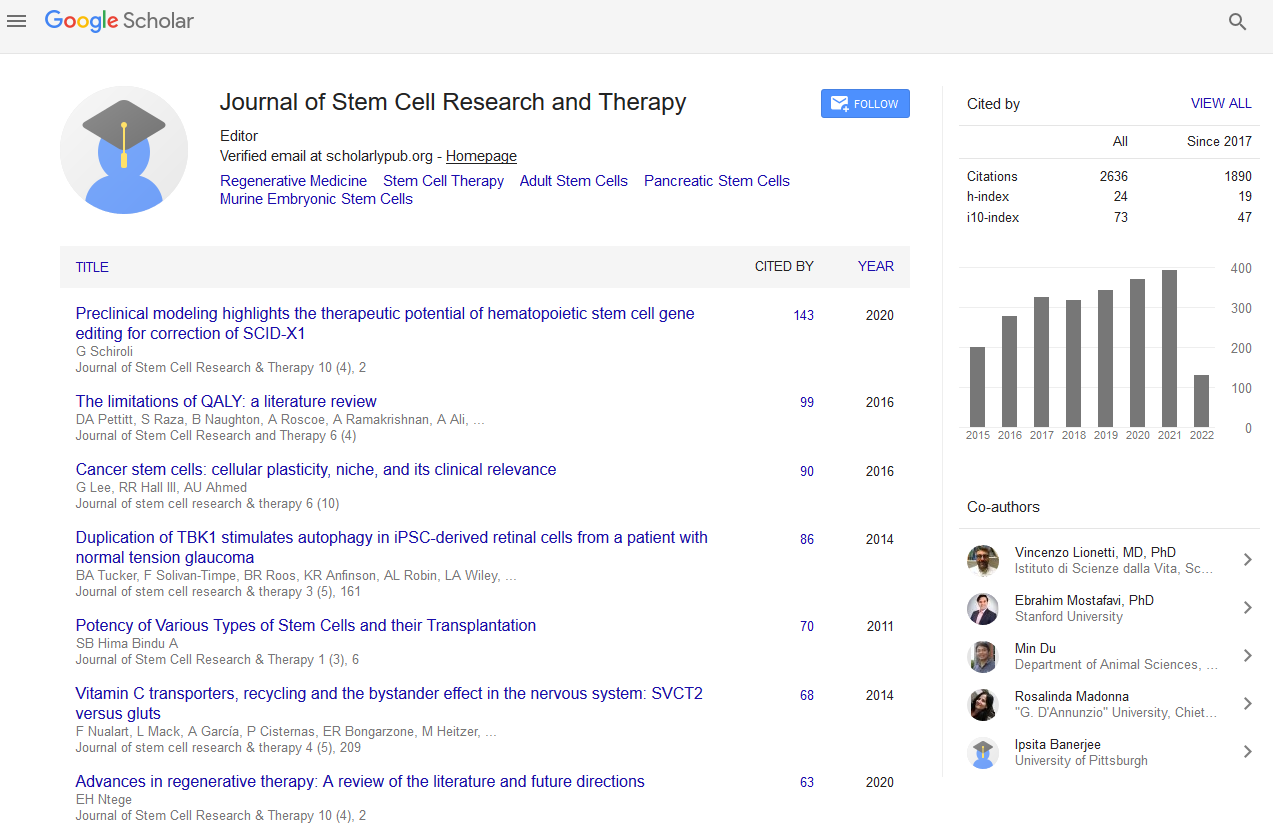Indexed In
- Open J Gate
- Genamics JournalSeek
- Academic Keys
- JournalTOCs
- China National Knowledge Infrastructure (CNKI)
- Ulrich's Periodicals Directory
- RefSeek
- Hamdard University
- EBSCO A-Z
- Directory of Abstract Indexing for Journals
- OCLC- WorldCat
- Publons
- Geneva Foundation for Medical Education and Research
- Euro Pub
- Google Scholar
Useful Links
Share This Page
Journal Flyer

Open Access Journals
- Agri and Aquaculture
- Biochemistry
- Bioinformatics & Systems Biology
- Business & Management
- Chemistry
- Clinical Sciences
- Engineering
- Food & Nutrition
- General Science
- Genetics & Molecular Biology
- Immunology & Microbiology
- Medical Sciences
- Neuroscience & Psychology
- Nursing & Health Care
- Pharmaceutical Sciences
A novel role of BMI1 in prostate cancer
Annual Summit on Cell Signaling, Cell Therapy and Cancer Therapeutics
September 27-28, 2017 Chicago, USA
Qi Cao
Weill Cornell Medical College, USA
Scientific Tracks Abstracts: J Stem Cell Res Ther
Abstract:
Prostate cancer (PCa) is the second leading cause of cancer-related deaths in American men, excluding skin cancer. Although most cases will be effectively treated with chemotherapy and/or radiotherapy, 11% of patients diagnosed with PCa will acquire recurrent and/or metastatic disease with a mortality rate of nearly 100%. Androgen receptor (AR) signaling plays a critical role in prostate cancer progression. However, androgen depletion therapy has proven ineffective. Patients relapse and develop castration-resistance. Therefore, identification of novel molecular targets is essential for the development of new treatments. Epigenetic modifiers, such as polycomb group (PcG) proteins, are also crucial in cancer initiation, progression, and metastasis by modifying histones and non-histone proteins. Two polycomb repressive complex 1 (PRC1) proteins, RING1B and BMI1, are essential for PCa stem cell maintenance and are associated with PCa metastasis. However, the precise role of the PRC1 complex remains unclear. B lymphoma Mo-MLV insertion region 1 homolog (BMI1) has been shown associating with metastatic prostate cancer by cDNA microarray analyses and tissue microarray analysis. BMI1 is an epigenetic component of a polycomb repressive complex 1 (PRC1), maintaining gene repression. We have demonstrated that BMI1 promotes prostate cancer progression by repressing multiple tumor suppressors. Here we discovered a novel function of BMI1 in prostate cancer by regulating androgen receptor (AR) protein and pathway. Furthermore, our pre-clinical tests demonstrated that BMI1 is therapeutic target for advanced prostate cancer patients.
Biography :
Qi Cao earned his PhD in Pathology from the University of Michigan in 2008. He was a Research Investigator in the Department of Pathology at the University of Michigan before becoming a member of the Houston Methodist Research Institute in 2013. He is an Assistant Professor of Inflammation and Epigenetics, Institute for Academic Medicine at Houston Methodist and Assistant Professor of Microbiology and Immunology, Weill Cornell Medical College. He has been working on the functions of polycomb group proteins in prostate and breast cancer for over 10 years.


